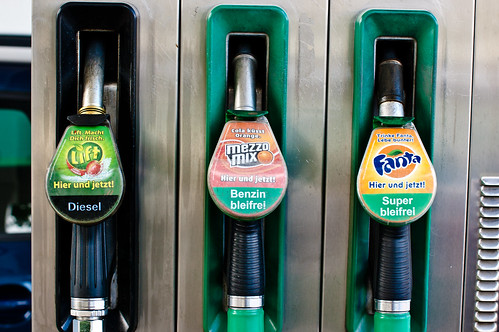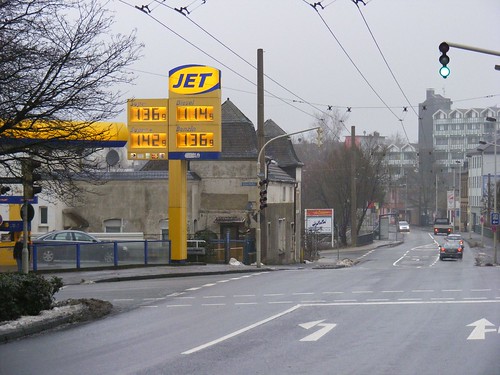At A Petrol Station: German Vocab Posted by Constanze on Jun 23, 2017 in Language
Guten Tag! Inspired by this post on the Greek blog, I thought it would be handy to look at German vocabulary related to petrol stations and driving – as this is something practical, important, and which you will use in day-to-day life in Germany.
This is the German road sign for a petrol station:
Some of the petrol station names to look out for in Germany are: Aral, Shell, Total, Esso, Avia, Jet and Agip, to name a few.
Obviously, the main word to look out for is die Tankstelle – petrol station.
The Germans have a verb for the act of filling up your car with petrol: tanken. Whereas in English we’d have to say the equivalent of ‘Ich brauche Benzin’ (‘I need to get petrol/gas’) or ‘Ich muss zur Tankstelle’ (‘I need to go to the petrol station’), in German you can simply say Ich muss tanken. This comes from the English word tank. ‘I need to tank’. I’m not joking when I say that this verb has amused me since childhood – probably because I recognised the mixture of German and English and found it wonderfully simple!
When you head to the Tankstelle to do some tanken, be sure to know which type of fuel to put into your Auto (car):
Petrol /Gas– das Benzin
Diesel – der Diesel
You may also see Benzin described as Bleifrei – unleaded, or as one of the following: Normal, Super, Super Plus.

Diesel, Benzin bleifrei (unleaded petrol), Super bleifrei (super unleaded). Photo by tacker on flickr.com under a CC license (CC BY-ND 2.0)
If you’re renting a car (which you’d do from a place called die Autovermietung, or das Mietwagenbüro – car rental place) and you’re unsure of the exact fuel type your car needs, be sure to ask – or even get them to write it down for you (this information is probably written down somewhere anyway, but just in case you are unsure, you could always ask for clarification):
Welchen Kraftstoff braucht das Auto? – Which fuel type does the car use?
Würden Sie das bitte für mich aufschreiben? – Would you write that down for me, please?
Better to be safe than sorry.
At the Tankstelle, use die Pumpe (the pump) to fill your car up, firmly close der Tankdeckel (petrol cap cover), note which number Säule (pillar) you are at, then go and tell the cashier so you can pay for your fuel. ‘Nummer vier, bitte’ – ‘Number four, please’.
While at a petrol station, you may also want to do the following things:
die Windschutzscheibe waschen – Wash the windscreen
die Autoreifen aufpumpen lassen – Have the tyres pumped up
Einen Kaffee kaufen – Buy a coffee (sehr wichtig – very important!)
If you’ve driven in Germany before, what was your experience like? Was there anything ungewöhnlich (unusual) about the petrol stations you visited, or was it all very straight-forward? Let us know in the comments!
Bis bald,
Constanze

Build vocabulary, practice pronunciation, and more with Transparent Language Online. Available anytime, anywhere, on any device.






Comments:
Pius:
I have rent autos and driven in Germany. 30 days last year. I find the Petrol stations signs easy to read, interpret.
Michael Brown:
I find that Germans on the whole drive very fast as if every road is a speedway. Every turn becomes a challenge as to how fast you can enter and exit with top speed. Is the road accident rate higher in Germany higher than other European countries or USA?
Mike
AskAGerman:
@Michael Brown i dont know. put some decades ago there was no speed limit outside the towns. maybe that sticks to us. but we germans are scared of driving in france and italy. they are crazy over there
doris:
thanks, so helpful.